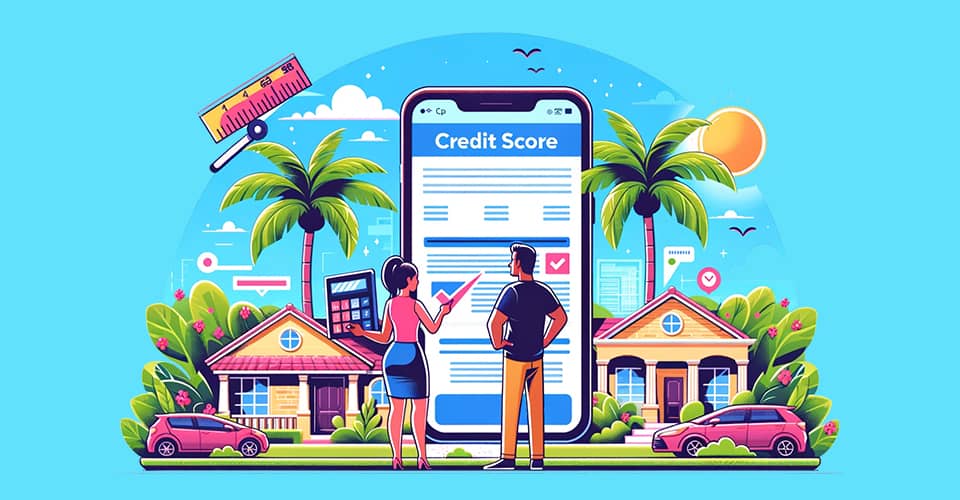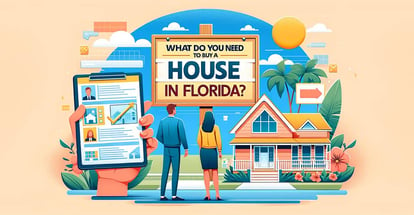What Credit Score Is Needed to Buy a House in 2025 in Florida?
A lender will consider your qualifying credit to approve or reject your loan application. Then again, lenders follow specific rules determining the credit score you need to buy a house in Florida. These guidelines vary by the type of loan.
Here’s a review of the credit score you need to buy a house in 2024 in Florida:
Minimum Credit Score by Loan Type
The minimum credit score to buy a house in Florida varies by the lender and loan type. Some loans have high credit score requirements, while others have no credit score minimums whatsoever.
Here’s a breakdown of the minimum credit score by loan type:

Conventional Loan | Minimum Credit Score: 620
Conventional mortgages are the most common home loan option. The minimum credit score for this loan is usually 620 points, depending on the lender.
Even though conventional loans have a high minimum credit score, the interest rates are lower, and the approval process is smooth and seamless. You can get a traditional loan through a mortgage lender, a credit union, or a mortgage broker.
FHA Loan | Minimum Credit Score: 580
FHA loans are mortgage loans administered by the Federal Housing Administration but issued to borrowers through private lenders. The primary objective of this loan is to make homeownership more affordable by relaxing down payment requirements.
Even though your credit score does not alter your interest rate, most lenders demand a minimum score of 580 points.
FHA loans have a minimum 3.5% down payment requirement. Even though many lenders want a minimum credit score 580, you can still qualify with scores as low as 500. However, borrowers need a 10% down payment for lenders to consider their application.
Hometown Heroes Program | Minimum Credit Score: 640
The Florida Hometown Heroes loan program is designed to support a broader range of individuals working full-time in Florida in their quest for homeownership. This initiative extends beyond specific professions, making it accessible to more residents.
A minimum FICO score of 640 is required for all loan types. Desktop Underwriter (DU) blended FICOs are not permitted. For Manufactured Housing (MH) and manual underwrites, a minimum score of 660 is necessary.
Borrowers must be employed full-time by a Florida-based employer. This requirement applies to all applicants except veterans. Full-time employment, defined as 35 or more hours per week, is a prerequisite for eligibility.
VA Loan | Minimum Credit Score: 580
VA loans are mortgage loans available to eligible active service members, veterans, and their surviving spouses. These loans are for primary residences. You can use your loan to purchase a house, build a home from scratch, or improve your current property.
Since the Department of Veteran Affairs backs the loan, lenders are more willing to provide favorable terms to borrowers. These loans are flexible because they have no down payment requirement and no minimum credit score, although some lenders demand 580 points.
They are available as 100% loans, meaning you can get the total purchase price of the home you intend to buy. Besides, they have the lowest interest rates compared to other home loans.
You must provide a Certificate of Eligibility (COE) to obtain a VA loan. This document highlights your service history and other eligibility requirements, allowing the lender to determine if you qualify for the loan.
Jumbo Loan | Minimum Credit Score: 680
Jumbo loans are home loans for purchasing expensive luxury properties. This credit option exceeds conforming loan guidelines by the Federal Housing Finance Agency. It helps aspiring homebuyers service substantial loans higher than the local limits.
Since jumbo loans involve substantial amounts, they have rigorous eligibility requirements. First, you must have a stellar credit score of at least 680 points to qualify.
They don’t have government backing, meaning borrowers must have ample cash reserves to cover their payments before receiving the loan.
Depending on your credit score and income, the down payment may vary between 5% and 25% of the home value. You can use this non-conforming loan for various properties, including a second home, investment properties, and vacation homes.
USDA Loan | Minimum Credit Score: 580
USDA loans are mortgages issued to aspiring homebuyers in non-urban areas (rural areas, small towns, and suburbs). The U.S. Department of Agriculture guarantees the loan to protect lenders against losses. For this reason, lenders are willing to offer flexible terms.
It has no minimum credit score requirement, but most lenders require a score ranging from 580 to 640 points. Moreover, the loan has no down payment requirement, and interest rates are 0.50% lower than traditional loans.
Factors that Determine Your Credit Score
Lenders use your credit score to determine your likelihood of making prompt mortgage payments. FICO uses various factors to calculate your overall credit rating. They highlight your financial habits and credit history, helping lenders evaluate your current financial status.
Factors that determine your credit score include the following:
Payment History
Your payment history accounts for 35% of your credit score. It highlights whether you’ve consistently made prompt payments.
It also defines the specifics around late payments, such as the number of late payments and the bill's duration being past the due date. Lenders use this information to determine your payment habits and whether you’ll repay your loan on time.
Current Credit Usage
Your current credit usage refers to the amounts owed against how much you can borrow. It compares your total debt against your credit limit, making up 30% of your credit score.
The quickest way to calculate your credit usage is to divide your outstanding balance by your limit. For instance, if your credit limit is $10,000, and your credit card has a $6,000 balance, your current credit usage is 30%. The lower your outstanding debt, the higher your credit score.
Length of Credit History
Your credit history accounts for 15% of your credit score.
FICO calculates the length of your credit history based on how long you have had credit accounts open, including the age of the newest and oldest credit accounts. It shows how long it has been since you utilized these accounts.
Keeping your credit card accounts open for a long time can help improve your credit score. Ensure you use your card responsibly to not dent your credit history.
Credit Types
You can open different credit accounts, such as installment loans, credit cards, finance company accounts, retail accounts, and mortgages. How you use these accounts makes up 10% of your credit score.
Even though having different credit types is not mandatory, it shows lenders you can manage various financial obligations responsibly.
New Credit Lines
Opening a new credit account impacts your credit score by 10%. It lowers your credit rating and remains on your report for at least two years.
The only exception is that your score will decrease once, no matter how many financing options you’ve applied for within a 14-45-day period.
Avoid opening new credit lines within a short period, as doing so might indicate to the lender that you are a risky borrower/consumer. Too many recent credit accounts might negatively impact your credit score and decrease your pre-approval chances.
Tips to Boost Your Credit Score
Having a low credit score can be detrimental to your approval chances. Even if you get approved, you’ll likely pay higher interest rates and closing costs. The good news is that credit scores are not set in stone.
You can work to boost your credit score using these tips, improve your pre-approval chances, and make purchasing your dream home in Florida easier.
Review Your Credit Report
You can access a free annual credit report at AnnualCreditReport.com.
The document provides information on your payment history and current financial situation based on your account balances. Credit bureaus use this report to determine your FICO score.
As much as credit bureaus strive to be as accurate as possible, your credit report might have errors and omissions that could impact your overall score. These discrepancies can chop off over 100 points from your credit score.
Considering this, you should review your credit report regularly and report any mistakes to the relevant agencies. Corrections can help improve your credit score and increase your mortgage pre-approval chances.
Do Not Close Old, Unused Credit Accounts
The length of your credit history and the number of open accounts contribute 25% to your credit score. FICO calculates your score based on how long these accounts have been available and your number of credit accounts.
Closing unused credit accounts can negatively impact your credit score since lenders won’t have access to information about your previous accounts. Keep your old credit cards open since your credit score increases with well-established credit accounts.
Request Credit Limit Increase
Another strategy to boost your credit score is to request a higher credit limit. FICO calculates your credit rating based on your credit utilization ratio.
It compares your credit card balance against your credit limit to determine your score. The lower your outstanding debt against your limit, the higher your credit score.
A higher credit limit increases your purchasing power but lowers your credit usage ratio. Although this tip has the potential for accumulating more debt, stay disciplined and keep your spending habits the same to avoid financial problems.
One benefit of a higher credit limit is that it shows lenders you can meet your financial obligations even during more challenging economic times. It can add over 50 points to your credit score, improving your mortgage pre-approval chances.
Pay Your Bills Promptly
As stated, your payment history is the most significant factor that impacts your credit score. It accounts for 35% of your credit rating.
Your payment history shows whether you’ve consistently made prompt payments and defines the specifics around late payments.
Paying your bills and outstanding balances on time can help boost your credit score. Interestingly, you might notice changes to your credit rating in as little as 30 days as long as you keep up with your payments.
Even if things are tight, do not miss your payments. It is better to make minimum monthly payments on time than default altogether.
You can set up a reminder or automatic online payments to keep up with your bills. You can also request your creditors to send emails or text reminders, reminding you to meet your financial obligations.
Avoid New Credit Lines
Opening a new credit account impacts your credit score by 10%. It lowers your credit rating and remains on your report for at least two years.
The only exception is that your score will decrease once, no matter how many financing options you’ve applied for within a 14-45-day period.
To prevent hard credit inquiries, avoid taking on new debts or credit cards quickly. Instead, work with what you already have to avoid impacting your credit score negatively.
After all, opening new credit lines signifies financial indiscipline and shows lenders you cannot manage your current finances.
Practice Patience
Let’s face it. You cannot improve your credit score overnight. You might notice minor changes to your credit rating in at least 30 days. Significant changes can only occur after about six months.
Considering this, you must practice patience as you wait to boost your credit history for the long term. Ensure you keep your outstanding balance to a minimum and make prompt payments to improve your score.
Use a Credit-Builder Tool
As stated, there are no quick fixes to improving your credit score. However, some recommend using online credit builders like StellarFi to improve your credit score. These online tools monitor, record, and report your credit activity to credit firms such as TransUnion and Experian.
Some credit-builders automatically pay your bills, helping you build a positive credit history. They work via subscription, and you must have sufficient funds in your credit accounts to facilitate automatic prompt payments.
Credit Items Mortgage Lenders Consider When Approving a Loan
Mortgage lenders consider various factors before approving a loan application. Credit items they look for during the pre-approval stage include your credit history, personal assets, derogatory items, and payment history.
Here’s a breakdown of what lenders review during pre-approval:
-
How promptly have you been paying your bills and outstanding debts?
-
What is your current debt load?
-
How is your current debt load spread out?
-
Have you recently opened new credit lines?
-
How much credit management experience do you have?
-
Do you often let items go into debt collections?
- Have you ever been bankrupt?
Mortgage lenders often ask these questions to determine how well you manage your bills.
Aside from your financial health, derogatory items such as delinquent accounts and bankruptcy also provide an outlook of your financial status, although they can’t disqualify you from getting a mortgage.
You can still buy a house in Florida with a mortgage even if you were once bankrupt or lost a home to foreclosure.
Buying a House with Bad Credit
A low credit score or “bad credit” does not disqualify you from getting a home loan. Lenders consider other compensating factors before approving or rejecting a mortgage application.
Here’s how you can buy a house with bad credit:
Make a Larger Down Payment
You can always cancel out a low credit score by placing a larger down payment.
Putting down a substantial amount reduces the risk to the lender, making them more willing to approve your mortgage application.
Request Multiple Lenders
Do not settle for the first lender you encounter when shopping for a home loan.
You can submit multiple applications with different lenders. If your application does not meet USDA requirements, it might pass the test when applying for a VA loan.
Join a Co-Signer with a Higher Credit Score
If your credit score is too low to qualify for a loan, you can request someone with a higher score to become a joint applicant.
A co-signer is any individual willing to be responsible for the mortgage. The co-applicant doesn’t have to live with you but will have a share in owning the home.
Final Thoughts
Your credit score indicates your current financial status. Mortgage lenders evaluate your current score to determine your home loan eligibility. You can boost it by making timely payments and tracking your credit usage.
Contact a reputable lender like MakeFloridaYourHome to learn more ways to improve your credit score to buy a house in Florida in 2024.
With over 50 years of mortgage industry experience, we are here to help you achieve the American dream of owning a home. We strive to provide the best education before, during, and after you buy a home. Our advice is based on experience with Phil Ganz and Team closing over One billion dollars and helping countless families.

About Author - Phil Ganz
Phil Ganz has over 20+ years of experience in the residential financing space. With over a billion dollars of funded loans, Phil helps homebuyers configure the perfect mortgage plan. Whether it's your first home, a complex multiple-property purchase, or anything in between, Phil has the experience to help you achieve your goals.


 By
By  Edited by
Edited by 






